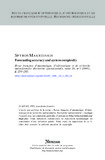Search
Now showing items 1-5 of 5
Forecasting accuracy and system complexity
(Fontainebleau, France, 1995)
Accurate forecasts are essential for a great number of applications yet large errors and considerable uncertainty characterize most of our attempts for predicting the future. This article surveys empirical studies on ...
The M3-Competition: results, conclusions and implications
(Elsevier, 2000)
This paper describes the M3-Competition, the latest of the M-Competitions. It explains the reasons for conducting the competition and summarizes its results and conclusions. In addition, the paper compares such results / ...
Why combining works?
(Elsevier, 1989)
The purpose of this paper is to explore the reasons why combining works, discuss the implications involved and propose guidelines for improving the field of forecasting by exploiting the reasons that contribute to the ...
Forecasting accuracy and the assumption of constancy
(Elsevier, 1981)
Statistical forecasting is based on the assumption of constancy, or structural ability in the data. This paper argues that such an assumption might not always be realistic in real life forecasting situations. Unfortunately, ...
‘Horses for Courses’ in demand forecasting
(Elsevier, 2014-02-22)
Forecasting as a scientific discipline has progressed a lot in the last 40 years, with Nobel prizes being
awarded for seminal work in the field, most notably to Engle, Granger and Kahneman. Despite these
advances, even ...





